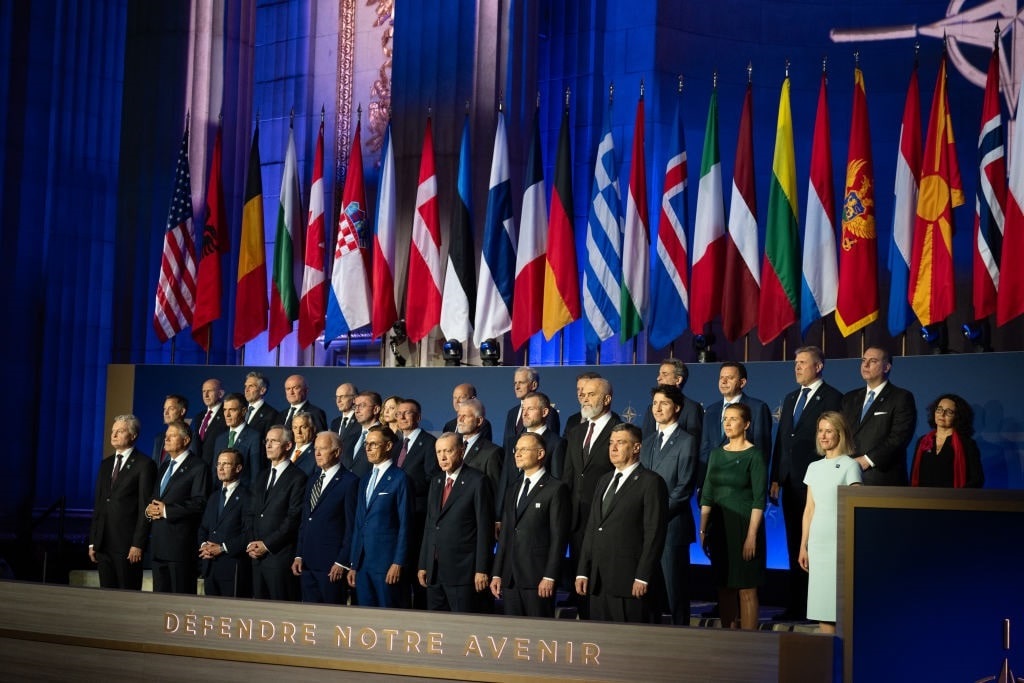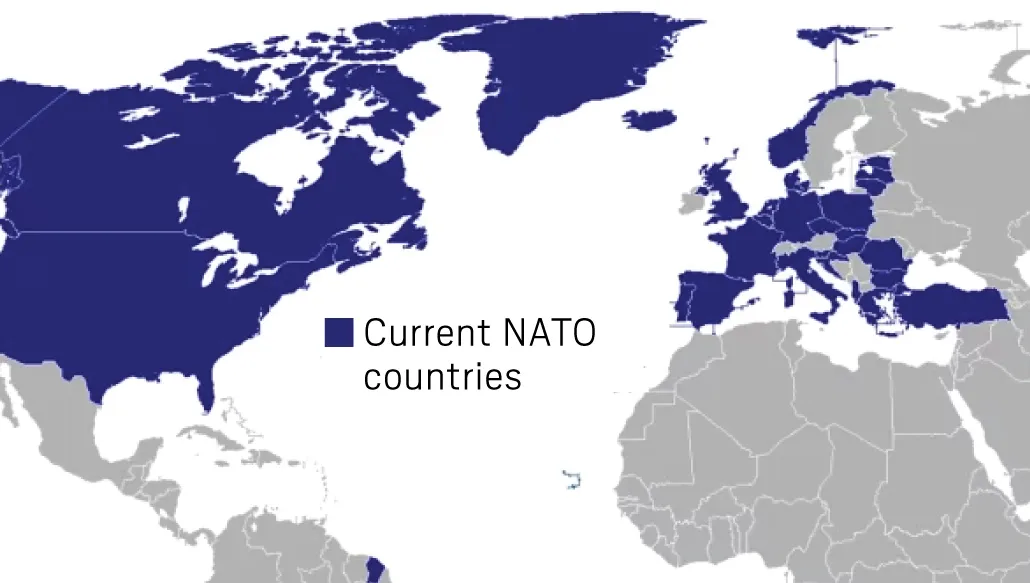Table of Contents
Dave Patterson
Liberty Nation

(Photo by Andrew Harnik/Getty Images)
A seminal outcome of the 2024 NATO Summit was the acknowledgment that the Alliance must confront China. It was a shot across Beijing’s bow, and the People’s Republic of China (PRC) did not miss it. Until this year’s summit meeting, the Indo-Pacific was not solidly on NATO’s list of to-dos. Recent collaboration between China and Russia supporting Russia’s unprovoked invasion of Ukraine changed that.
NATO Asserts China Is a Culprit
During President Joe Biden’s press conference following the NATO Summit meetings, he took the opportunity to revise history regarding his administration’s military support leading up to Russia’s unprovoked invasion of Ukraine. However, he failed to emphasize an important policy statement in the 2024 NATO Summit’s Washington Declaration. The declaration is a statement of principles the delegates issued following their meetings. This year, North Atlantic Alliance heads of state firmly called out China as a culprit in supporting Moscow’s war against Ukraine, saying:
“The People’s Republic of China’s (PRC) stated ambitions and coercive policies continue to challenge our interests, security and values. The deepening strategic partnership between Russia and the PRC and their mutually reinforcing attempts to undercut and reshape the rules-based international order…The PRC has become a decisive enabler of Russia’s war against Ukraine through its so-called ‘no limits’ partnership and its large-scale support for Russia’s defense industrial base.”
The declaration echoes the remarks of NATO Secretary General Jens Stoltenberg, who asserted that the PRC provides the tools, resources, and microelectronics that allow Russia to build its missiles, bombs, and aircraft. However, the statement is important because it reveals that the entreaties by US diplomats and President Biden to Beijing not to support Russia’s war of aggression have failed. Additionally, the NATO declaration clearly opened the door to greater focus by the Alliance on the Indo-Pacific as a region where malign actors threaten peace.
As one might suspect, the Chinese Communist Party (CCP) propaganda machine went into high gear. During the PRC Ministry of Foreign Affairs’ regular press conference on July 12, the Xinhua News Agency reporter asked how China would respond to NATO Secretary General Stoltenberg’s comments about China becoming a “decisive enabler of Russia’s war against Ukraine.” The foreign ministry spokesman, Lin Jian, declared, “China strongly condemns the irresponsible and provocative remarks made by the NATO Secretary General against China, which are steeped in Cold War mentality and ideological bias and consist of baseless accusations.”
Lin berated the secretary general and called Stoltenberg’s comments an attack that “blatantly interfered in China’s internal affairs and distorted China’s domestic and diplomatic policies… We strongly deplore and firmly oppose it.” He characterized the enabling support to the Kremlin invasion of Ukraine as “normal military development and relations.” That is the point the NATO delegates were making. The CCP’s enabling support of Russia’s brutal attacks on Ukraine has become “normal” for China.
Then, in what appeared to be a gratuitous swipe at President Biden, the Foreign Ministry spokesman said, “China urges [a] certain Western politician, whose political life is approaching an end, not to fan the flames, make provocations, and shift blames for the sake of trying to leave behind some kind of legacy.” Though designed as provocative, it is interesting that the PRC press flack has picked up some of the narrative that political wonks in the US are spreading.
A Growing Interest in the Indo-Pacific
NATO’s rebuke of China is evidence of a growing interest on the part of the Alliance in the Indo-Pacific. “For the third straight year, a group of countries with ties to the Alliance, called the Indo-Pacific Four [South Korea, Japan, Australia, and New Zealand], have sent officials to attend the summit in person. Members of NATO say this is a sign that the two regions increasingly see their security as shared,” Defense News reported. A recent comprehensive report by the Center for Strategic and International Studies (CSIS) described the growing importance of Indo-Pacific nations and their relationships with bad actors in the region.
“US engagement has been effective in aligning European perspectives and approaches to the region. China is now a major focus of transatlantic discussions and European countries have prioritized developing a common approach,” the CSIS study observed. An example of European-Pacific having common interests is the Australia, United Kingdom, and United States (AUKUS) initiative started during the Trump administration will provide Australia with nuclear submarines and the technology that goes with that capability. The AUKUS agreement will establish a more formidable defense for US Indo-Pacific allies to deter China from aggression in the South China Sea and the Taiwan Straits.
The 2024 NATO Summit ensured NATO’s commitment to continuing the flow of weapons and other assistance to Ukraine. However, the delegates’ strong rebuke of China for supporting Russia was a first. “NATO has generally avoided criticizing China, which fields one of the world’s most powerful militaries,” The Wall Street Journal explained. That was then. This is now.
The views expressed are those of the author and not of any other affiliate.
This article was originally published by Liberty Nation.









